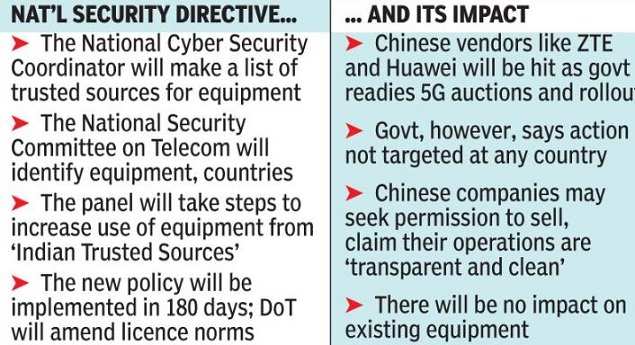
The action, finalized by the Cabinet Security Committee (CCS), will result in a list of trusted government sources and products, which will also modify the licensing rules for telecommunications companies. Although the government refrained from specifying the country to be affected, it was clearly targeting India’s aggressive neighbor, with companies such as Huawei and ZTE will likely face increased scrutiny, and even rejection, to protect itself from any undercover operations and potential threats to the telecommunications infrastructure.

Huawei counts Airtel, Vodafone-Idea and other enterprise customers as its key customers in India, while ZTE is a major provider of BSNL and other state-owned companies.
While it will not affect equipment that has already been deployed, in the future all telecommunications equipment, especially those used for 5G services, will be kept under strict surveillance.
“The methodology for designating trusted products will be devised by the designated authority, the National Cyber Security Coordinator. Telecommunications service providers (mobile operators) must connect new devices designated as trusted products, ”said the minister of communications and IT. Ravi Shankar Prasad he said, adding that the policy was framed with the country’s security needs in mind.
Chinese equipment suppliers are already under the scanner globally, with countries like Australia, the US and the UK banning their access, especially in the 5G space, while others like Germany increase scrutiny.
In addition to equipment suppliers, some telecom operators who have been acquiring products from Huawei and ZTE are also nervous, especially after the government stepped in to restrict Chinese products for state-owned BSNL and MTNL.
Some of the mobile operators fear that any further escalation between India and China will mean network support and updates from Chinese providers stall. It can benefit European players like Nokia and Ericsson, The American Cisco and the South Korean Samsung, especially when it comes to the implementation of 5G services and infrastructure.
In recent months, India has banned the import of equipment from China for use in sectors ranging from telecommunications to energy, citing national security. Some of the bans were due to concerns such as spyware or malicious software, known as “malware,” embedded in imported equipment. Additionally, there has been widespread action against Chinese apps like TikTok, PubG, UC Browser, WeChat, and CamScanner, most of which have been banned due to national security concerns.
Speaking about the decision, Prasad said: “The list of trusted source and product will be decided with the approval of a committee headed by the deputy national security adviser. The committee will be comprised of members from relevant departments and ministries and will also have two members from industry and independent experts. The committee will be called the National Telecommunications Security Committee. ”
The government will create a list of designated sources from which purchases cannot be made. “This directive does not contemplate the mandatory replacement of existing equipment already installed in the TSP network,” said the minister.
Last year, the government had banned imports of Chinese phones without the International Mobile Equipment Identity, or IMEI number, again citing security reasons such as the use of stolen phones to make scare calls or hoaxes.
The IMEI number of a mobile phone is a unique 15-digit number for each phone. It prevents stolen phones from making calls and allows law enforcement agencies to track down a specific user.
Prasad said the directive will not affect annual maintenance contracts or upgrades for existing equipment already installed on the network as of the directive’s effective date.
.